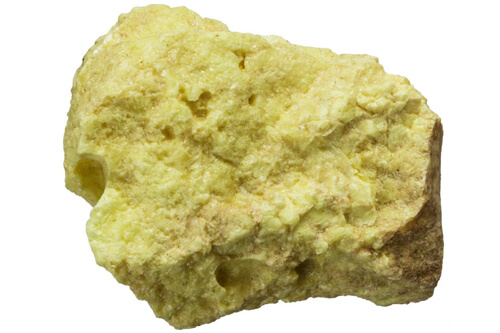Type
Element (Minerals/Ores of)
Mineral Classification
Native
Chemical Formula
S
Streak
White
Mohs Hardness
1.5-2.5


Type
Element (Minerals/Ores of)
Mineral Classification
Native
Chemical Formula
S
Streak
White
Mohs Hardness
1.5-2.5
Crystal System
Orthorhombic
Color
Bright Yellow to Yellow-Brown
Luster
adamantine, resinous, dull
Fracture
Conchoidal
Sulfur (S) is a bright, lemon yellow, soft, non-metallic element that has a very low thermal conductivity, meaning it cannot transfer heat very well. The touch of a hand will cause a sulfur crystal to crack because the crystal’s surface warms faster than the interior. Sulfur melts at 108 degrees Celsius. Sulfur means “burning stone” in reference to its source from volcanoes and that it burns so easily. When sulfur is burned it combines with oxygen producing sulfur dioxide, SO2, which has a sharp pungent smell.
Sulfur attaches to metal ions, creating a number of significant sulfide ore minerals such as galena (lead sulfide), pyrite (iron sulfide), chalcocite (copper sulfide), and sphalerite (zinc sulfide). Mined sulfur is mostly from salt domes or bedded deposits. The vast majority is produced as a by-product of oil refining and natural gas processing.
Sulfur mining uses three different mining techniques: conventional underground methods, conventional open-pit methods, and the Frasch mining (or underground melting) method. In this process, hot water is forced into the sulfur deposit. The sulfur melts and is pushed to the surface where it is collected and allowed to cool and solidify, or shipped in molten form.
The majority of the sulfur produced in the United States is used to make sulfuric acid. Sulfuric acid has multiple uses in the production of chemicals, petroleum products and a wide range of other industrial applications. Sulfur’s main use is in making chemicals for agriculture, mostly for fertilizers. Other uses of sulfur include refining petroleum, metal mining, and the production of organic and inorganic chemicals. A multitude of products (such as the production of rubber for automobile tires) require sulfur in one form or another during some stage of their manufacture.
If you have some questions about our products, please feel free to fill out the form below, and we will contact you within 24 hours. Rest assured that we won’t reveal your information to anyone.